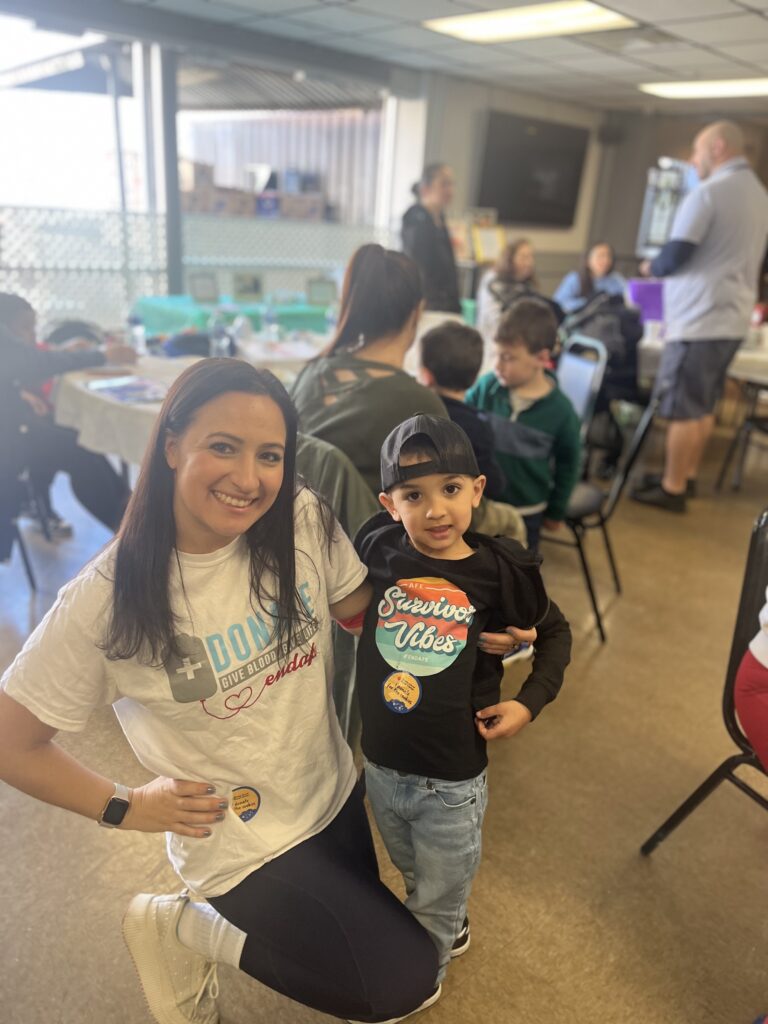Amniotic Fluid Embolism, or AFE, is a rare, dangerous and often life-threatening complication during childbirth. You may still be asking yourself exactly what AFE is. This birth complication can affect both mother and baby and is believed to be an allergic reaction to amniotic fluid that enters the mother’s blood stream during or after birth. According to the Cleveland Clinic, AFE affect 1 in every 40,000 deliveries in the United States.

Rebecca Elshanawany is an AFE survivor and is now working to raise awareness on the importance of blood donors as they helped save her life.
Her story in starting her family began like any other. She and her husband Ahmad married in 2018 and were getting ready to welcome their son Zayn in January of 2020. Rebecca tells Rhode Island Blood Center (RIBC), she had a healthy pregnancy, but things quickly took a turn during her delivery.
“There was no way to predict what was to come. After my AFE occurred while giving birth, I was intubated and had no idea what happened to me – I didn’t even know I had the baby.”
During her labor and delivery, Rebecca went into disseminated intravascular coagulation or DIC, which is a severe bleeding condition. This is one of the two most common complications associated with AFE. Because of this complication, Rebecca required several different blood products as she fought to survive.
“I personally went into DIC and required 6 units of red cells, 5 units of fresh frozen plasma, 2 units of cryo (a blood product that is used to control bleeding for those whose blood is not clotting properly) and 1 unit of platelets.”
Rebecca eventually regained consciousness and spent 10 days in the hospital recovering from AFE. It was during that time she learned the severity of the complications she faced as a result, including suffering from a stroke and having to undergo an emergency hysterectomy that saved her from bleeding out.
Through all of this, she is grateful for one thing. That her son Zayn does not have any lasting impacts from the AFE complication.
“He is completely healthy and the funniest, smartest, kindest little 4-year-old! I am also doing well but have tingling and weakness in my entire right side due to the stroke. From the outside, you would never know, but it is something I deal with every day.”
Rebecca tells RIBC that while she physically recovered from surviving her ordeal, she struggled mentally with survivor’s guilt. Noting most women, and sometimes their children, do not survive AFE. Therefore, she decided to take that pain and turn it into action to help others.
“It was really important for me to find a way to give back and honor those who weren’t as lucky as Zayn and myself. I found out that AFE Awareness Day was March 27th and decided to host my first blood drive just 2 months after my AFE.”
For the last four years, Rebecca has focused on making the drive bigger and better than the year before. In 2024, her drive had its largest turnout, with 49 presenting donors. Her husband makes sure to donate every year at the drive as he saw firsthand how donors saved his wife’s life.
Rebecca has one simple message to those have not donated or are scared to.
“DO IT! You never know when you or someone you know may need blood. It is literally the simplest thing to do, takes 15-20 minutes of your time every few months, but makes a lasting impact. You will feel great about what you did, and you truly are saving lives. It doesn’t hurt! It’s really not that bad.”
Rebecca and her family have also gone on to celebrate another incredible milestone after her ordeal. Thanks to a surrogate, they were able to welcome their daughter Dalia in January of 2024. They are now a happy and healthy family of four who are looking to pay it forward by raising awareness on the importance of blood donors.
If you are inspired by Rebecca’s AFE survival story, you can make an appointment by visiting ribc.org/donate or call 401.453.8383.
